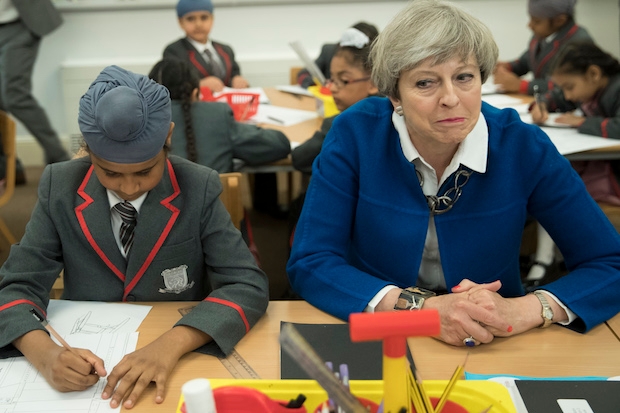On the surface, today’s front pages don’t make enjoyable reading for the Prime Minister. The Sunday Times leads on a YouGov poll which says the Conservative lead has been slashed to single figures for the first time since last year, while the Mail on Sunday splashes on a Survation poll — claiming the Tory lead has dropped by five points as a result of the ‘dementia tax‘.

Sunday Times/YouGov poll
Now a dip in popularity for the Conservatives isn’t entirely unexpected. It comes after the party revealed a manifesto that could hardly be described as feel-good. Pensioners (at least in England and Wales) were dealt a triple whammy blow on pensions, winter fuel and social care while there was little reason for cheer elsewhere with free school lunches also to be cut. Instead of making pledges to woo voters, Theresa May warned of the ‘giant challenges’ facing the UK and the tough decisions that would have to be taken as a result.
It’s understandable that May’s pitch to Labour voters could prove a hard sell. In contrast to the Conservatives no-frills manifesto, Corbyn has promised a sweet shop’s worth of treats, from scrapping tuition fees for all students to keeping the pensions triple-lock. With Labour on 35pc in today’s YouGov poll (where Ed Miliband was at this stage in the election campaign), it’s votes from Ukip rather than votes from Labour that are propping up the Tory vote.
Some Tories will now feel justified to complain about the state of the campaign. High levels of control-freakery and a focus on ‘Theresa May’s team’ is only acceptable to MPs if it works. The Prime Minister’s social care plans — which would see more pensioners have to pay for their care — have already caused complaints within the party.
So, is a Tory landslide now looking unlikely? Well, there are a few reasons to refrain from drawing this conclusion just yet. Firstly, even with a mere nine-point lead, the Conservatives would win comfortably. Secondly, if the 2015 election taught us anything it was not to read too much into every poll — and that polling tends to be favourable to Labour.
Finally, this could actually help the Conservative campaign. Back in 2015, bankers were dividing up their homes in London in anticipation of a Prime Minister Miliband and his mansion tax. In this election, the suggestion of Jeremy Corbyn as Prime Minister is more likely to generate laughter than fear. CCHQ has found it a lot more difficult this time around to make Corbyn appear a credible threat as they did with Red Ed. It follows that if it looks as though Labour have a chance — even a very small chance — then the Tory attack lines warning of a ‘coalition of chaos’ with Jeremy Corbyn as Prime Minister might start to take effect.







Comments